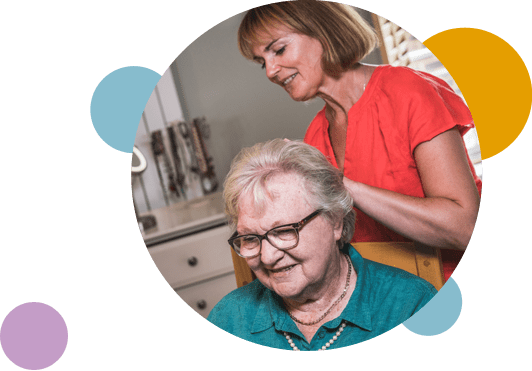Who is considered a family carer?
According to the NHS, a family carer is anyone who looks after a family member, partner or friend who needs support because of their illness, frailty, disability, mental health concerns or addiction.
It is often difficult for people to separate their care role from the existing relationship they have with the person they are caring for. Many family caregivers struggle to see themselves as carers. This often occurs because the responsibilities of caring for a loved one tend to increase gradually over time.
The majority of people will take on a carer role at some point in their lives, even if it is only for a short time. Family carers are often required to juggle their care duties with work, school or other commitments. Young carers in particular are often hesitant to share the fact that they are carers with family, friends or health professionals due to fear of separation, guilt, pride or other reasons.
If you are currently supporting or caring for a loved one, it is important that you consider your role as a carer and the resources available to you. Carer burnout and fatigue are especially common amongst family carers as they often feel guilty for seeking extra support. By ensuring your own physical and emotional needs are met, you will be able to provide the best quality care for your loved one.

What are the duties of a family carer?
Family carers take on most of the same duties and responsibilities as professional carers. The time spent being a carer for a family member varies from person to person. Some people move in with the person they are caring for while others visit them throughout the day or week.
Depending on the requirements of the person you are caring for, your responsibilities as a family carer might include:
- Household duties
- Personal care
- Medication administration and management
- Mobility support
- Cooking and meal planning
- Pet care
- Running errands
- Companionship
- Emotional support
What financial support is available to family carers?
There are many unforeseen costs to becoming a family carer. Financial concerns can be especially challenging for family carers who are often faced with having to work less in order to care for their loved ones.
Thankfully, you may be entitled to one or more government benefits to help you cover the costs. Here are the carer’s benefits that you could be entitled to and how you can get them:
Carer’s allowance
Carer’s allowance is the main state benefit for carers. It is £67.25 a week. You are entitled to carer’s allowance if you look after someone for more than 35 hours a week. You do not have to be related to, or live with, the person you care for.
You may not be entitled to this allowance if you get more than £67.25 a week from some other benefits. It is still worth applying as you may have what’s called an underlying entitlement to carer’s allowance. This can help increase other benefits you’re getting.
Carer’s credit
Carer’s credit is a National Insurance (NI) contribution. It is there to make sure you do not lose out on social security benefits, such as the State Pension, because of gaps in your NI record due to caring for someone.
You may not be entitled to Carer’s Credit if you look after someone for more than 20 hours a week and you do not get carer’s allowance.
Carer’s premium
Carer Premium is an allowance you get on top of some other benefits. You may be entitled to this premium if you already get another benefit, such as Income Support, Universal Credit or Housing Benefit.
Getting a carer’s assessment
If you are a family carer, you may be eligible for support from your local council. In order to determine your eligibility, you will need to get a carer’s assessment. A carer’s assessment is free and anyone over 18 can ask for one.
This is a separate process from the needs assessment which is used to determine if someone is entitled to support for their care needs. You can ask for a carer’s assessment for yourself and a needs assessment for your loved one at the same time.
A carer’s assessment might find you eligible for a variety of support services including respite care, help with taxi fares, training for how to lift safely and even a gym membership or exercise classes to help you relieve stress.
To start the process of getting a carer’s assessment, contact your local council. You can call or begin the process online.
How we can help
If you are caring for a loved one, you do not have to do so alone. Caring for a loved one that requires day-to-day support can be physically and emotionally taxing. Respite care at home is a short and flexible arrangement that allows for a person to be cared for in the comfort and familiarity of their own home by a professional carer. This gives a family carer the opportunity to take a break from their usual care duties to rest and recharge their batteries.
We have been providing high-quality, award-winning care across England and Scotland for over 10 years. Our dedicated service enables people to keep living independently at home while still receiving the care and support they need. Our care is designed to not only improve our client’s happiness and quality of life but to also deliver improved health outcomes and enhanced well-being.
Whilst you refresh and recharge, your loved one will receive the highest quality live-in care or visiting care, provided by a carer who is able to meet their medical, social, domestic and personal needs. And all in the place they know and love best – their own home.
Contact our friendly advisors to receive a no-obligation care needs assessment.
Talk to us about your care needs
To talk about your care needs, contact one of our friendly advisors. Calls from landlines are free.
